Workshop Colonial Contexts in Libraries
A conference report by Christine Kühn
On 6-7 November 2023, about 60 researchers and librarians from more than 16 institutions came together at the Berlin State Library to discuss colonial contexts in libraries. For the first time, a comprehensive programme combined diverse issues and approaches. Various library-specific fields of action were identified: provenance research on collections, decolonisation of libraries, handling of metadata, appropriation of intangible cultural assets, ethical and legal considerations regarding sensitive content, and finally digitisation and access to information for Communities of Interest. Speakers from Cameroon, Kenya, Liberia, Namibia, and Sri Lanka offered their perspectives via video messages on this inaugural gathering. The event was organised by the dbv-Kommission Provenienzforschung und Provenienzerschließung and the project IN_CONTEXT: Colonial Histories and Digital Collections together with the German Lost Art Foundation (DZK).
The conference started with keynotes from Hermann Parzinger (President of the Prussian Cultural Heritage Foundation), Larissa Förster (DZK), Michaela Scheibe, and Larissa Schmid (Berlin State Library) in the Berlin State Library. The first two panels centred on acquisition and object histories, not only limited to objects from unlawful contexts but also addressing whether the provenance of an object has been sufficiently explored. Discussions delved into the issue of colonial power structures and how these have been perpetuated, past legal arrangements and contracts for travel and acquisition notwithstanding. Ralf Kramer from Bayerische Staatsbibliothek (Bavarian State Library) sparked a discussion on the ultimate goal of researching colonial provenances, questioning the validity of keeping objects as permanent loans from Communities of Interest or restituting digital objects in lieu of physical ones.
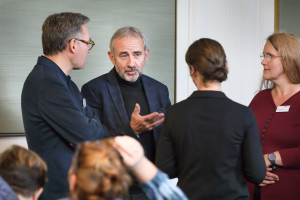
Hermann Parzinger in conversation with Achim Bonte, Larissa Schmid, and Michaela Scheibe (Photo: Hagen Immel)
The afternoon of the first day continued with panels on ethical and anti-racist perspectives. Julia Zenker from the university library of the Humboldt University and the FID Sozial- und Kulturanthropologie (specialised information service Social and Cultural Anthropology) raised questions about digitizing certain contents and objects, exploring the issue of what should be digitised and who is allowed to make this decision in the end. On the one hand, there might be uncertainty whether the pictures and texts depict culturally or religiously sensitive topics, on the other hand, digitisation cannot guarantee access via the Internet for Communities of Interest as this largely depends on the infrastructure available to them. Simon Cubelic from the Centre for Asian and Transcultural Studies at the University Heidelberg highlighted the importance of identifying suitable contacts for possible restitutions within Communities of Interests. Sometimes, it might make sense to look for civic instead of official players. Afterwards, it was Anne Peiter who addressed the question whether the display and use of images taken from colonial contexts is possible without perpetuating the colonial gaze. The focus then shifted towards the broader library praxis. Moritz Strickert of the university library of the Humboldt University presented the vocabulary work carried out by the workgroup Thesauri of the Network Colonial Contexts, which puts a variety of different thesauri in relation to each other. Birgit Kramreither and Birgit Athumani Hango of the Vienna University Library and Maike Mewes and Jantje Bruns of the library of Museum am Rothenbaum, a one-person library, gave reports on their respective processes of decolonisation, e. g. regarding their collections and creating a context for the users with the help of a statement, a QR code referring to additional pieces of information, and anti-racist guided library tours.
The second workshop day began with a panel on colonial collection practices: How colonial knowledge structures are entrenched in cartographic and library collections of the Perthes Verlag and determine today’s access to archival materials and literature was the focus of the contribution by Petra Weigel from the Gotha Research Library at the University of Erfurt. The following lecture provided insights into the colonial connotations of Christian missionary literature and the representations of Communities of Interest in contrast to the Christian missionaries at mikado, the library and documentation centre of the International Catholic Missionary Society missio e. V. The discussion then shifted to the philological level in the lecture by Irene Albers and Andreas Schmid from the Free University of Berlin on collection practices: To what extent are stories from colonised countries anonymised and reprocessed in anthologies before they are commercially exploited in fairy tale collections for a German audience? Of course, the holdings of the Berlin State Library were also the subject of Meliné Pehlivanian’s lecture on the Ernst Dammann Collection of the Oriental Department.
In the panel on digitisation, Elke Brehm discussed whether ethnographic film material that was originally recorded for research purposes might be used outside of research purposes, considering ethical and not just legal issues. Maria Hermes-Wladarsch presented the Digital Collection of German Colonialism project. She then discussed how the selection of the collection can depend on the definition of colonialism and how, in this way, library collection practice is always an expression of the current situation.
In the panel on metadata and presentation, the question over an alleged neutrality of metadata was explored – after all, it is always produced by those who create it. Christoph Rauch from the Berlin State Library also provided insights into current developments in the Qalamos portal on provenance research, we learnt about the role played by FAIR and CARE principles and the development of personas for the DDB’s Collections from Colonial Contexts portal and considered why the “Dresden” Maya Codex is actually associated with Dresden and how accessibility for Latin American communities is affected if it is only presented on a website in German and English.
The presentations and lively discussions were interspersed with impulses and interventions through recordings by Mutanu Kyany’a from Kenya, Debey Sayndee from Liberia, Naazima Kamardeen from Sri Lanka, Albert Gouffo from Cameroon, and Werner Hillebrecht from Namibia. Mutanu Kyany’a emphasised that cooperation is necessary not only to give Communities of Interest access to their cultural assets and information about their cultures but also to initiate real transformation. Naazima Kamardeen expressed a lack of understanding of the arbitrariness of restitution decisions by custodian societies and the associated inequality between actors and criticised the concept of the “global South”, the content of which is better defined by the “global majority”. Albert Gouffo expressed the desire for joint bibliographies or collections of shared knowledge between Cameroon and Germany.
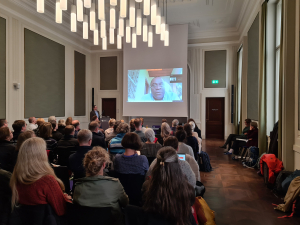
Albert Gouffo talks via video message to the participants (Photo: Christine Kühn)
One of the original motivations of the workshop, namely a joint reflection on drafting guidelines for libraries and their handling of colonial contexts, inspired by the guidelines for handling collections from colonial contexts of Deutscher Museumsbund (German museums association), which museums already use, was realised in the form of pinboards with questions for the participants. This meant that there was always room for discussion, exchange, and participation during the breaks. In the last time slot of the workshop, the answers and comments were presented and put up for discussion.
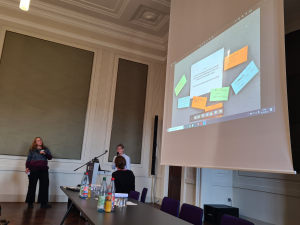
Michaela Scheibe and Regine Dehnel present the results on the pin boards (Photo: Christine Kühn)
You can view the detailed programme with lecture titles, participants, and institutions here.
For further exchange, interested individuals are invited to join future meetings of the network Colonial Contexts and the network Decolonize the Library.
Hopefully, this workshop sparks further cooperative initiatives, fosters ongoing dialogues between libraries, cultural heritage institutions, practitioners, researchers, and Communities of Interest. Planned future projects include a thematic issue in o-bib in 2024 and an international conference.


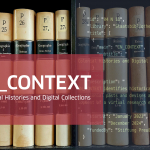
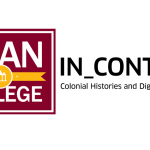
Leave a Reply
Want to join the discussion?Feel free to contribute!